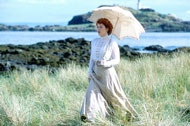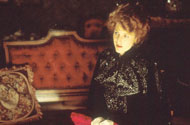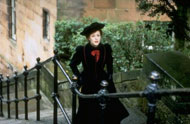|
|
|
When a woman has the beauty men admire and women envy … it is wise to tread carefully. The House of Mirth (House of Mirth) UK 2000 by Terence Davies with: Gillian Anderson (Lily Bart), Eric Stoltz (Lawrence Selden), Dan Aykroyd (Gus Trenor), Eleanor Bron (Mrs. Peniston), Terry Kinney (George Dorset), Anthony LaPaglia (Sim Rosedale), Laura Linney (Bertha Dorset), Elizabeth McGovern (Carry Fisher), Jodhi May (Grace Stepney) |
|
Gillian Anderson als Lily Bart New York, 1905. Though dependent on her aunt, Lily Bart (Gillian Anderson) has a great deal going for her: beauty, wit, wealthy, well connected friends, and true independence of spirit — but she’s in a dilemma over her future: should she settle for lawyer Lawrence Selden (Eric Stoltz), with whom she’s discovered a mutual attraction and the prospect of romantic happiness, or aim, conventionally, to wed someone... well, richer? The rules of the game are harsh and inflexible, and when she catches the eye of Gus Trenor (Dan Aykroyd), husband to a friend of the influential Bertha Dorset (Laura Linney), the proud, almost perversely honourable Lily falls prey to the gossip, hypocrisy and manipulations of a set that values decorum, reputation and status above all else. Terence Davies’ masterly adaptation of Edith Wharton’s novel is an extraordinary triumph which simply puts most other recent screen adaptations of the classics to shame. Though period and place are very sensitively evoked, Davies sidesteps superficial details to home in on both the cruel nuances of the in-crowd’s polite rituals and the resultant suffering as Lily succumbs to disgrace, despair, poverty and worse. Shot in ’Scope, it’s a marvellously elegant (but mercifully unflashy) film of faces in expressive, sombre close-up, and succeeds as an intellectually satisfying, emotionally devastating study of injustice, enforced solitude, wasted opportunities and love never quite gratified. The casting (which also provides substantial roles for Anthony LaPaglia, Elizabeth McGovern, Eleanor Bron and Jodhi May) is inspired, while Anderson in particular fully repays her director’s faith with an immaculate, unsentimental but enormously moving performance. Davies’ discreetly imaginative writing, sure sense of pace, and customary unflinching honesty make for a film that touches both the heart and mind very deeply indeed. Absolutely superb; don’t miss it. Geoff Andrew, TimeOut
With consummate grace and exceptional style, Terence Davies transformed Edith Wharton's caustic tragedy of manners into a somber, languid dream. New York, 1905: In the rarefied air of high society, where a young woman's vocation lies in marrying well and one false move can leave her reputation in tatters, Lily Bart (Gillian Anderson) is playing a dangerous game. A charming, unmarried woman of increasingly limited means, Lily knows her time is nearly up; she's getting older, she's been out in society for too long, and she's running up debts she can't repay from the allowance her aunt (Eleanor Bron) grants her. Lily piques the interest of a dull, wealthy prig (Pearce Quigley), but lets him slip through her fingers for an afternoon dalliance with the man she could marry for love, fortuneless lawyer Lawrence Selden (Eric Stoltz). In the eyes of her best friend Judy Trenor (Penny Downie), Lily's made a big mistake. But it isn't nearly as damaging as the financial arrangement Lily makes with Judy's husband (Dan Aykroyd), who agrees to invest a little money on Lily's behalf. When he starts handing her dividend checks with the expectation of a little gratitude, the tongues of Lily's vain and shallow "friends" begin wagging, and her downfall has begun. In a film studded with good performances — Laura Linney is perfectly terrifying as Lily's smiling nemesis, Bertha Dorset — Davies took a gamble with Anderson, a largely untried dramatic actress best known for her work on TV's The X-Files. The risk paid off: With a raised eyebrow and curled upper lip, she never seems completely comfortable in the role of coquette, and there's something slightly artificial about her performance. In a sense, she's perfect for the role of a woman who, as Selden describes her, "has it in her to be whatever she believed to be." When the mask slips, she's heartbreaking. Ken Fox, TV Guide Online
Jonathan Rosenbaum, Chicago Reader
|
Director: Terence Davies Runtime: 140 min Awards: British Academy Awards 2001 Nominated Alexander Korda Award for Best British Film Terence Davies, Olivia Stewart // British Independent Film Awards 2000 Best Actress Gillian Anderson // Golden Satellite Awards 2001 Best Art Direction Don Taylor // USC Scripter Award 2001 Nominated Terence Davies (screenwriter) |
|
Image: Once again VCI have delivered a fine picture for this release. It is 2.35:1 anamorphic and full of atmosphere. The dark alleys and badly light halls of the Victorian New York are well represented with rich dark wood colours in the background. The level of detail is quite stunning in places and indeed the deep blacks are rich and solid. I seriously doubt that any other studio could have done a better transfer. R2-dvd.org
|
VCI / FilmFour Distributors |










